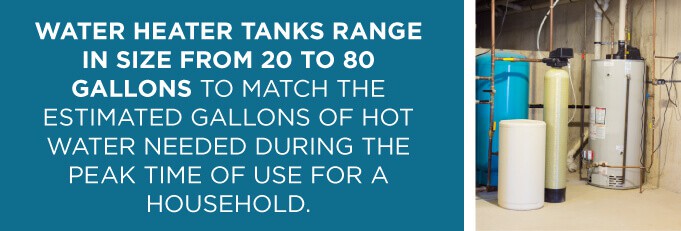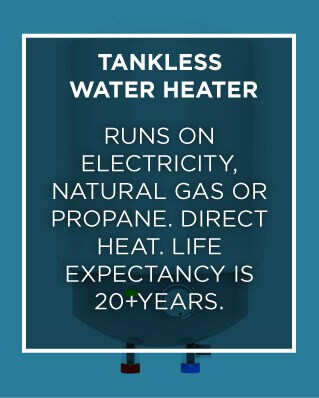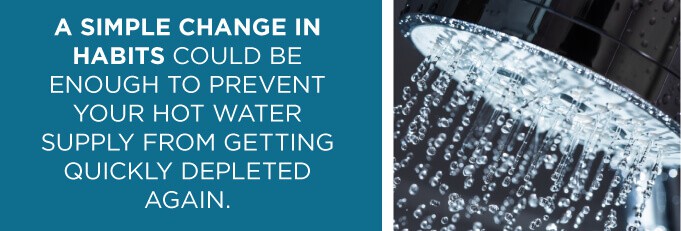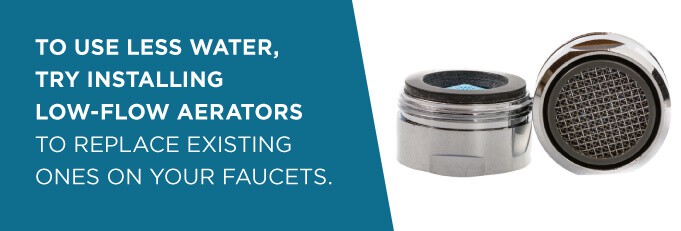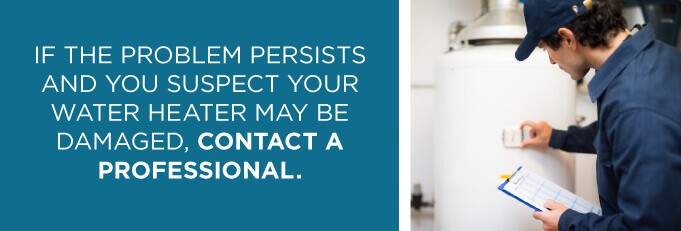Jump to Section: Why Am I Running Out of Hot Water | How Water Heaters Work | Types of Water Heaters | Does Weather Affect My Hot Water Heater? | Top Reasons You Run Out of Hot Water | [VIDEO] Wrong Size Water Heater | Solutions to Prevent Running Out of Hot Water | Tips for Maintaining Your Hot Water Heater
Imagine being in the middle of a relaxing, hot shower — and then, the water turns cold. Especially after a long day when hot water can ease away tension, feeling a sudden shock of cold water that stays can chase you right out of the bath. Or think of an abrupt end to your warm dishwasher. Now what?
You might not have to imagine this scenario if it happens to you nearly every day. It could be you’re using more hot water than in the past. But if you’re beginning to experience these types of problems often — and your hot water runs out after five to ten minutes — it’s time to stop wondering why and start looking for solutions. You likely have an issue with your hot water heater that’s causing you to run out of hot water.
Because water heating is the second largest expense in the American home, accounting for 14–18 percent of our utility bills, it’s worth your while to read this guide. Understand the reasons your hot water runs out quickly. Then take easy steps to prevent it.
Why Do I Have No Hot Water?
The most common reason you don’t have any hot water is because your hot water heater is being used by other household systems. 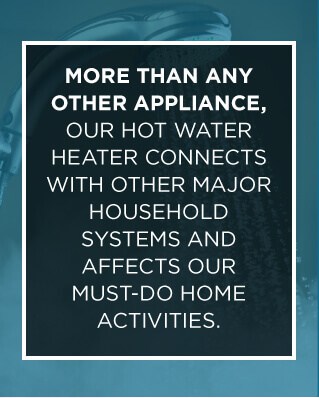
- Bathe in a bathtub
- Wash at the bathroom sink
- Prepare food at the kitchen sink
- Wash dishes at the kitchen sink or in a dishwasher
- Wash clothes in a washing machine
- Clean anything in the house by porting hot water in a container drawn from any faucet
You might not think about how much you rely on your hot water heater until something goes wrong. Usually, that happens at the most inconvenient times — whether you’re in the shower or washing the dishes.
Let’s review the potential reasons you run out of hot water as well as solutions to prevent it from happening. We’ll also cover important tips you can follow to maintain your water heater’s capacity to deliver as hot as you need, when you need, and to extend the life of the appliance.
How a Hot Water Heater Works
Most homes have a tank-type water heating system that stores a certain amount of hot water on reserve in a tank. With a tank system, a large enclosed cylinder stands upright with pipes attached — usually in a basement or utility room.
When you turn on the hot water taps at an appliance, shower or sink, the hot water tank provides the source of heated water that travels through water pipes to the tap or line.
The hot water tank has two functions — heat the water and keep it warm. The tank, equipped with a heating system, thermostat and insulation, maintains the temperature between heating cycles.
A water supply pipe at the top of the tank supplies cold water to the bottom of the tank through a tube. A heating element at the bottom heats the water. The hot water delivery pipe, also on the top of the tank, connects to the pipes that run to sinks, baths and showers.
Water heater tanks range in size from 20 to 80 gallons to match the estimated gallons of hot water needed during the peak time of use for a household. By using the number of rooms and bathrooms to estimate the number of people that might use water in a home, you can reliably estimate how large a heater tank you need.
Water heaters are rated by their size and how much water they provide in one hour’s time. For instance, if your hot water unit is rated 40, this means it can supply 40 gallons in roughly 60 minutes before it needs to refill and reheat.
Most tanks are made of a steel exterior with a glass lining. The lining provides insulation and protects against corrosion. A magnesium or aluminum rod inside uses its natural physical properties to pull corrosive elements away from the steel. All water tanks will corrode over time because of the steel, but materials used in design add longevity. When a tank fails, corrosion is typically the cause.
The heat sources that warm tank-type water heaters are either gas or electricity. Because gas heats more efficiently and therefore is less expensive, the majority of water heaters today are fueled by natural gas.
Learn more about Home Water Heaters
Types of Hot Water Heating Units
Over the years, developments in technology and our understanding of efficient energy use have led to more options when choosing a water heater.
Tank-type, also known as storage water heaters, remain the most widely used. Your house probably has a tank-type system. That’s because most residential energy options are still traditional electric and natural gas hook-ups. However, as solar continues to become a more available option, hot water heaters powered this way are becoming more popular.
The types of hot water heaters are categorized using two engineering design factors:
- The power source or fuel supply.
- The process the system uses to heat and transfer water to your pipes.
Here are the main types of hot water heating units, their life expectancy estimates and key points about each:
- Storage: Tank-type, runs on electric, natural gas or propane. Direct heat. Life expectancy is 10-15 years. Storage water heaters are the most affordable to buy.
- Heat pump: Uses a tank for hot water storage, however, the heating process uses electricity to move heat from the surrounding air into a tank to heat water. Runs on electric, geothermal energy or natural gas. Indirect heat. More efficient than conventional tank-type heaters. Life expectancy is 10-15 years.
- Tankless water heaters, demand-type: Heats and immediately passes the water through the unit to the pipes when a hot water tap is turned on. Runs on electricity, natural gas or propane. Direct heat. Life expectancy is 20+years.
- Solar: Can be used in any climate. Runs on sunshine. These systems include storage tanks and solar collectors. Indirect and direct heat systems. Up to 50 percent more efficient than gas or electric systems. Most expensive to buy right now. Life expectancy is 20 years.
- Combination water and space heating systems: Heats water using a home’s heating system. These systems are also known as integrated or tankless coil and indirect. Runs on electricity, natural gas, propane or fuel oil. Indirect heat. Life expectancy of 10-11 years.
Units that heat their water from different power sources operate very differently. These variations make certain units more susceptible to different types of damage or problems that cause you to run out of hot water. While this guide does not elaborate on those problems, sources drawn from to write this guide do. You will find more information on the different types of hot water heaters when you click links within this guide.
Another way to learn more is to contact a qualified contractor like Home Climates and ask us what we know. We will be honest with you about what we know and direct you to appropriate sources where needed.
Being informed of the options before you have to make a decision about a new hot water heater can give you time to consider your overall needs, then identify the type that fits best with your household. Your needs may be based on saving money, conserving natural resources, safety, efficiently using limited living space or a unique combination of these values.
Does Weather Impact Your Hot Water Heater?
If you live in a climate that experiences both cold and warm temperatures, while those temperatures may not affect your water heater specifically, they can affect your overall system and its efficiency especially if your system is in need of maintenance.

- Insulate your pipes. If you live in a climate like here in Pennsylvania where pipes can freeze, especially if those pipes are located in an exterior or not-as-often-heated area of your home, an expert like Home Climates can help you figure out how to best insulate to prevent frozen pipes.
- Inspect and insulate your water heater: While many water heaters already come with a layer of insulation, adding one to the outside could be a way to add efficiency to your unit. While DIY kits are available, a professional is best to help you determine if this is a good option.
- Prepare for power outages: Many homeowners need to find alternative sources of heat and warm water during a power outage from snow or winter storms. If your water heater is electric or solar, it won’t continue to work unless you have a generator or another power source. If the fuel supply of your water heater is gas, or the heat sources used during your power outage aren’t well-maintained or ventilated, it could be a source of carbon monoxide or other issues. Prepare for how you will handle these outages in advance.
Top Reasons Your Hot Water Isn’t Getting Hot
Before you read further, confirm in your mind the type of water heater you have, most importantly whether it uses a tank-type storage system or is tankless because this is the biggest factor. Here are some of the reasons your hot water isn’t getting hot in your home:
- You’re overusing hot water.
- The water heater tank size is too small for your household.
- Your hot water heater is tankless.
- Sediment or minerals have built up in your water heating system.
- Individual parts inside the hot water heater unit are damaged or worn.
- The heating element is burned-out.
A number of factors could contribute to running out of hot water too soon. The causes can vary from household to household and will depend on hot water usage levels, the type of water heater unit, the age of the unit, maintenance habits and plenty of other individual factors.
In many cases, there’s no need for concern. A simple change in habits could be enough to prevent your hot water supply from getting quickly depleted again.
However, repeated hot water loss after five to 10 minutes of hot water use may indicate a more serious water heater problem. A more serious issue might require a costly repair, an upgrade or a full replacement of your hot water heater. That’s why identifying the problem early — and doing something about it — could save you hundreds of dollars or more.
Note that items two and three identify a problem specific to a tank-type or tankless water heater. Depending on the type of hot water heater you have, you can rule out some of these possible reasons. Let’s look at each of the possible reasons and what to look for to confirm or rule out a factor.
1. Overusing Hot Water
Though we may enjoy long hot showers, the reality is that your hot water tank can only supply so much hot water at any given time. If you have several people in a household, and everyone showers at roughly the same time, then you may end up running out of hot water. This, of course, leaves the last person to shower with cold water.
Even with only one or two people in your household, taking long showers can use enough hot water to run out of your supply sooner than you realize.
Additionally, if you are running the washing machine or dishwasher at the same time as having a shower, this high-volume consumption of hot water can outrun the capacity of your water heating system or storage tank to keep up. You can outpace the hot water heater capacity even if one person uses hot water for hand-washing dishes in the kitchen while another showers in a bathroom.
2. Small Hot Water Tank Size
If you have several people living in your household and you’re repeatedly running out of hot water, your hot water tank may be an inadequate size for your needs. Perhaps your family or the number of people in your household has grown, or you have guests.
Do you have people in your home who regularly use hot water for projects or hobbies? Do you do a lot of hot water washing of uniforms, socks and towels for family members who exercise a lot or participate in sports? These are factors to consider when deciding if your hot water tank size is large enough.
3. Tankless Water Supply Size
A tankless hot water heater simply supplies hot water on demand, at the faucet or appliance as you use the water. There is no stored supply. Since there is no stored supply, if your unit has not been properly sized you may experience a reduction in your hot water supply. Tankless water heaters are a great and long-lasting option, but it’s essential to have a professional properly size the unit for your immediate and future hot water needs. Annual maintenance for your unit is also important for peak performance.
4. Sediment or Mineral Buildup
Sediment, which is any solid material carried by water, travels with the water through the pipes and into your home’s hot water tank, causing an accumulation of minerals. The sediment found in water heaters may be sand or debris from a well or water main. Minerals are often part of the sediment, usually in the form of calcium carbonate.
Despite the fact that your hot water heater has a filter to remove impurities, it doesn’t capture the “good” minerals like iron, magnesium and calcium. The more minerals build up in the bottom of your hot water tank, the more space they take up — which leaves less space for water. This leads to the hot water tank losing capacity to hold the amount of water it’s supposed to.
The hot water heater then becomes less efficient at heating and providing hot water to your household. Your home starts running out of hot water more quickly. Listen for popping or cracking sounds coming from your hot water tank to indicate possible sediment buildup.
5. Damaged Or Worn Out Parts
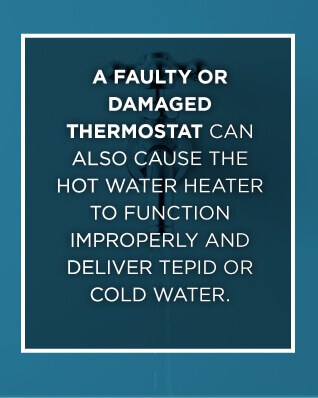
A faulty or damaged thermostat can also cause the hot water heater to function improperly and deliver tepid or cold water. In some instances, however, the thermostat may simply be set too low and a simple adjustment is all you need.
If you have a gas-powered hot water heater and you smell rotten eggs, the aluminum rod may be damaged. If your water is coming out in spurts, you could have a clog. The presence of mold or pools of water around the base of your heater may indicate a leak, which may be an indicator that your tank is not holding the amount of water it was built to store.
6. Burned-Out Elements
If the heating elements in an electric heater are old, burned-out or simply not large enough, they cannot heat all the water the tank holds. Sometimes the heating element loses its function because of sediment build-up. You can check the heating element voltage yourself by using a continuity tester on it, or you can call a professional to assess the problem and replace the elements as needed.
Which Reasons Apply to My Situation?
Now that you know some of the possible reasons households run out of hot water, you’ll need to determine which ones apply to your type of heating unit and specific household situation. If you continue to run out of hot water, take a look at your hot water heater as a possible reason, and use the list of reasons above to determine which ones may apply in your instance.
Ask yourself some questions to figure out the cause of your problem in particular:
- Are multiple people having showers at the same time or within an hour of each other?
- Are you running appliances that use hot water simultaneously?
- How old is your hot water heater?
- When was your hot water heater last serviced?
- When was your hot water heater last replaced?
- What type of hot water heater do you have?
- Have you had leaks in the past?
When you determine the cause of why you’re running out of hot water, you’ll be able to apply the right solution to fix it for the long term and prevent it from happening again. You might be able to solve the problem yourself, or you might need to call a heating, ventilation and air conditioning (HVAC) professional to fix it.
8 Solutions to Prevent Running Out of Hot Water
Depending on the reasons you’re running out of hot water at home, you may have several options for solving it. Some of the options can be relatively simple. One might involve replacing your unit entirely.
Here are some possible solutions to help your household avoid running out of hot water:
- Use less water
- Take shorter showers
- Schedule your showers
- Use eco-mode
- Wash clothes in cold water
- Upgrade to a more efficient unit
- Upgrade to a larger unit
- Contact a plumber
1. Use Less Water
This may seem like an obvious one, but some households simply use more water than others. Look for ways where you can try to use less water. Whether it’s by running your dishwasher less frequently or doing larger yet more infrequent loads of laundry, reducing your overall water usage by even a little goes a long way toward preserving your hot water. Try installing low-flow aerators to replace existing ones on your faucets.
2. Take Shorter Showers
Along the same lines as using less water, try to get everyone in your household to take shorter showers. Use a waterproof timer and place it in your shower. Aim for under five minutes per shower so as not to waste hot water. You can also reduce water used in the shower by installing shower heads with low-flow rates.
3. Schedule Your Showers
Most of us follow the same morning routine, which means that if there are several people in your household, multiple people might shower inside a one-hour period each morning. You may have to designate certain people to shower earlier or the night before. You can take turns weekly or daily being the one designated to shower earlier. Figure out a schedule that works for your family’s needs and remember it will save everyone from having the unpleasant cold shower experience.
4. Use Eco-Mode
Most dishwashers today have an eco-mode that uses less water more efficiently. The machine technology uses sprayers on both upper and lower racks, and uses a pre-soaking spray to soften food on dishes before applying soap for the wash. If you know you’ll have several appliances or showers running at once, be sure to place your dishwasher on eco-mode to prevent running out of hot water.
5. Wash Clothes in Cold Water
While certain types of delicate clothing are recommended for washing in cold water, other items can be washed in cold as well. Try putting your clothes in a cold-water wash. Today you can find specially formulated detergents designed to clean as well in cold water as a warm water wash.
6. Upgrade to a More Efficient Unit
Older units become less efficient over time. Check the sticker on your hot water heater to see if your tank is reaching the end of its life. It’s possible you may need to replace your unit to prevent running out of hot water. The money spent will be money saved inefficient use of your household energy.
7. Upgrade to a Larger Unit
If you’ve determined that you simply need a larger hot water unit to meet your family’s needs, then you’ll need to decide just how big to go. First, determine your family’s “peak hour” demand.
For example, one household’s peak time might be from 6:30 to 7:30 a.m., when they get ready to go to work and school. Use bathing, shaving, washing, any kitchen activity and clothes washing activity that may occur during that one hour to estimate a total number of gallons used. For benchmarks, the U.S. Department of Energy shows a person uses an average of 10 gallons of water for one shower. When using the kitchen or bathroom faucet, the estimated flow of water is two gallons per minute.
With your own estimate, you’ll need to find a hot water tank with an FHR (First Hour Rating) that’s within one to two gallons of your peak hour demand number. The hot water heater will display its FHR on the Energy Guide label.
8. Contact a Plumber
If the problem persists and you suspect your water heater may be damaged, contact a professional. A plumbing expert will be able to assess the problem and determine an appropriate solution so you can stop running out of hot water.
Tips for Maintaining Your Hot Water Heater
Hot water heaters require ongoing maintenance just like any other household appliance. Possibly even more, because they are working all day, every day to heat water, move it out, and maintain the heat for water stored in the tank.
If you’re constantly experiencing hot water issues, then you’ll need to consider how diligent you are in your regular maintenance. Follow these tips for maintaining your hot water heater so you can stop running out of hot water:
- Know the projected life span of hot water heaters: Hot water heaters may simply become less efficient over time. Knowing the estimated life span of your particular unit may help you to determine if it’s necessary to replace your water heater now, or if you can manage to wait a bit longer.
- Flush your hot water tank: Due to sediment accumulation, you need to flush your hot water tank every so often to get rid of the buildup, to keep water flowing and room in the tank for hot water only. Flushing the hot water tank requires emptying its contents entirely and getting rid of the sediment. You can do this yourself or contact a professional plumber to do it for you.
- Regularly check your thermostat: As part of regular maintenance, be sure to check the hot water heater’s thermostat often. It could be set too low, or it could be malfunctioning — which may cause your water to become cold.
- During colder months, and in colder climates, your hot water heater may have to work harder to keep the stored water hot. Wrapping a tank-type unit can prevent the water from losing its heat, and prevent the heating element from being on and using more energy than needed.
If you’re experiencing continual problems with running out of hot water, then learn more about how Home Climates can help. Home Climates has the professional expertise to help repair or install hot water heaters.
Contact us today and put an end to running out of hot water.
Interested in Plumbing Service?
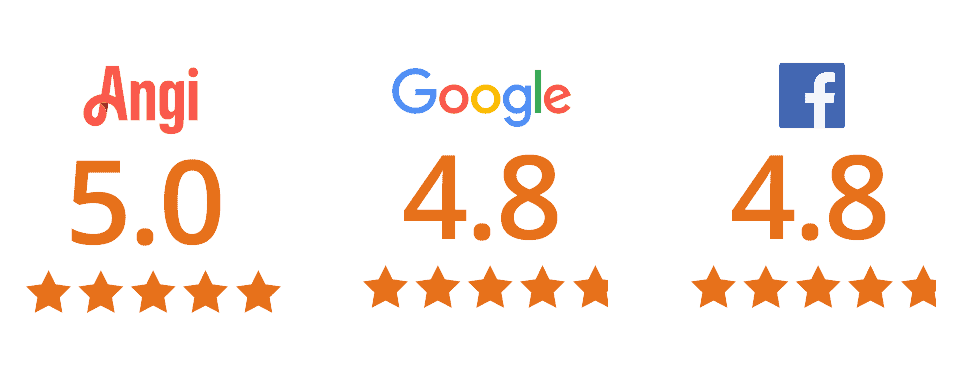
Home Climates Review Scored as of 9/22/22











